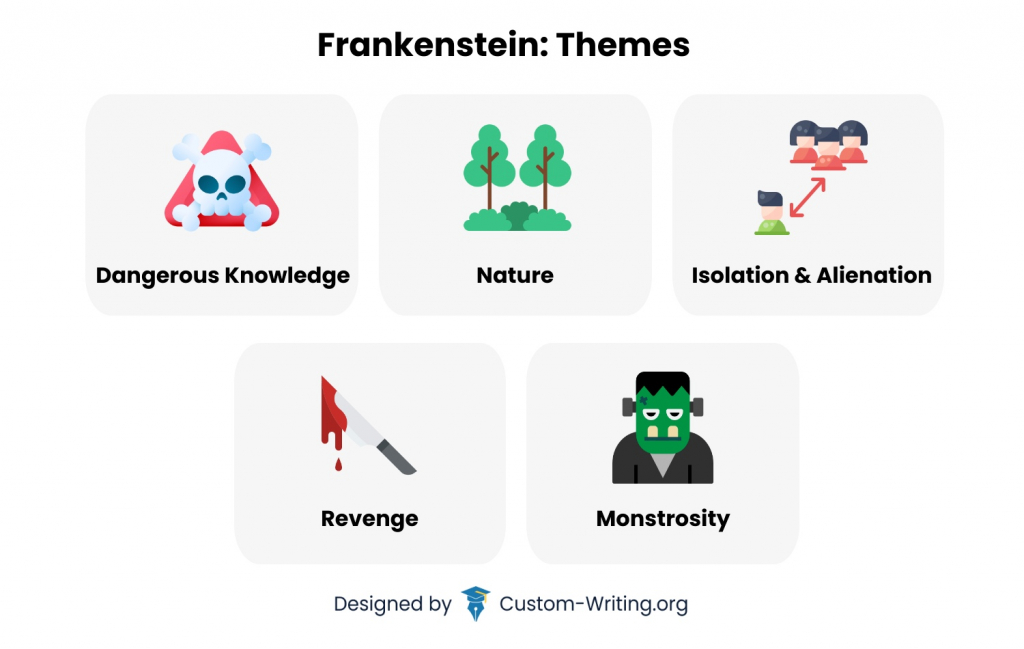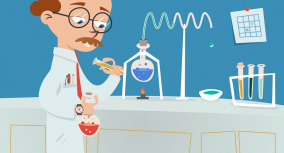Themes in Frankenstein by Mary Shelley include the issues of ambition, identity, responsibility, and isolation, which are as relevant today as they were in the 19th century. Central Frankenstein themes revolve around the consequences of scientific discovery and the pursuit of knowledge. At the same time, the emotional and moral core of the story is shaped by the topics of creation and responsibility, isolation, and the conflict between man and nature.
On this page, we will thoroughly discuss each of the main themes in Frankenstein, its symbols, and how they are connected to Mary Shelley’s commentary on human ambition and its unintended consequences. Whether you need to write an essay or prepare a presentation on Frankenstein by Mary Shelley, the themes explored here in detail will vastly assist you in your work.
🔑 What Are the Major Themes in Frankenstein?
The major themes in Frankenstein by Mary Shelley are: dangerous knowledge, nature, isolation, revenge, and monstrosity.

Dangerous knowledge.
The novel Frankenstein revolves around the theme of creation. Victor, having studied science at Ingolstadt, constructs the Monster.
In his attempt to create life, Victor is playing God. Later, we learn that his creation only brought him pain and dissatisfaction. He is forced to construct a partner for the Monster he has made but later understands his mistake and sets on a path to destroy all of his work.
Laws of nature.
The novel emphasizes the need to respect limits and the potential consequences of upsetting the natural order. The life and death cycle is a law of nature, and Victor Frankenstein disobeys this law when he employs science to manufacture life out of human remains. As a result, an innocent yet terrifying Monster is created, only to become aggressive when his demands aren’t satisfied.
Social isolation.
Frankenstein’s Monster desperately tries to find a way out of social isolation. It seemed to him that the DeLacey family had to love him and accept him because he secretly helped them and acted kindly. However, when he decided to approach them openly, he was rejected and kicked out. The Monster started to feel hatred towards people because of loneliness.
Revenge.
The Monster seeks revenge on his creator, Victor Frankenstein, after he destroys his female companion. The creature then murders Victor’s family members to make his life even more miserable. Similarly, Victor pursues the Monster to avenge his loved ones but dies in the process. Ultimately, both characters’ acts of revenge were pointless.
☠️ Dangerous Knowledge Theme in Frankenstein
In Frankenstein, dangerous knowledge is one of the most prominent themes. It seems like Mary Shelley decided to make this idea a foundation of the novel.
Victor Frankenstein aims to achieve something seemingly impossible – the creation of life. It is way beyond human power. Just like him, Robert Walton goes to the North Pole with the same ambition. He wants to surpass the discoveries of his ancestors and find another way there.
However, everything comes with a price. That is especially true when people try to uncover the universe’s secrets that should stay in the dark. Victor Frankenstein realizes that his pursuit of knowledge is a huge mistake.
Frankenstein’s creation destroys everyone dear to Victor. The reader can notice that Walton faces the same outcome. He gets stuck in the ice, forced to obey the unpredictable circumstances.
Here, Shelley nicely highlights that it is not late to step back yet. Along with the unwillingness to accept his responsibility, Victor’s obsession with revenge and untamed hatred leads him to death. Some quotes about science in Frankenstein support this idea.
I have described myself as always having been imbued with a fervent longing to penetrate the secrets of nature… Sir Isaac Newton is said to have avowed that he felt like a child picking up shells beside the great and unexplored ocean of truth.
Frankenstein, Victor Frankenstein, Chapter 2
Robert Walton, on the other hand, decided to retreat from a dangerous situation. The well-being of his man overweighs his desire for exploration. We can see that Walton learns from the mistakes of Victor. Frankenstein is the perfect example of how dangerous the thirst for knowledge might be.
🌳 Nature Theme of Frankenstein
The theme of nature in Frankenstein goes alongside the idea of the dangers of knowledge. Despite all the attempts of Victor to go against nature’s laws, it plays an essential role as a tool for setting the mood.
The beautiful descriptions of the surroundings are inspired by Romanticism, which was at its peak. Out of all the themes in Frankenstein, it is the only one related to spirituality and renovation. There are many quotes about nature in Frankenstein that confirm it.
Nature offers this so much needed rest and emotional renewal. For example, when Victor is torn apart by the despair after the two first deaths, he retreats to the mountains. Also, after the harsh winter and cold, the Monster feels uplifted when the spring arrives.
Therefore, the beauty of nature appears as the source of salvation and consolidation for the characters. However, Victor finds himself unable to use it anymore. The Monster will continue to haunt him everywhere.
At the end of the novel, Victor chases his creation in the ices of the North. The reader can see that it is when the weather and nature play the role of a symbol. And the strong winds and cold represent the struggle of Frankenstein against the Monster.
👽 Isolation & Alienation in Frankenstein
The theme of alienation in Frankenstein is directly connected to the events in the novel. Social isolation is the root cause of all the evil deeds committed by the characters.
The quotes from Frankenstein about isolation can highlight this issue. For instance, the Monster confesses that it is the alienation that makes him a murderer. However, all the deaths he causes only increase his loneliness. People reject him even more as his actions align with his appearance.
If I have no ties and no affections, hatred and vice must be my portion; the love of another will destroy the cause of my crimes, and I shall become a thing of whose existence everyone will be ignorant. My vices are the children of a forced solitude that I abhor, and my virtues will necessarily arise when I live in communion with an equal.
Frankenstein, Monster, Chapter 17
The same is with Victor. He isolates himself in the lab from the family and friends. Then, it becomes his prison. After the Monster is created, Frankenstein separates himself from everyone even more. He has to keep his creation secret.
Interestingly, isolation is also connected with the rejection of oneself. Even before anyone could judge the Monster, he is already repelled by his reflection in the mirror. Just like Frankenstein’s father notices, as long as your sense of self-value is alright, you will seek social connections.
The outcome and punishment of alienation is self-destruction. It is Frankenstein’s choice to leave everything and hunt down the Monster. In the end, he dies from it, and his creation kills itself as the result of alienation as well.
⚔️ Frankenstein Theme of Revenge
Let’s consider the character that decides to step on the path of revenge first. It is the Monster. At first, he is kind-hearted, but the different looks make people mistreat him. He decides to make all the humans hurt like he does after the DeLacey family rejects him.
There are multiple quotes about revenge in Frankenstein that can explicitly describe the feelings of the Monster. For example, he says revenge and hatred inside him cause him to turn his mind towards injury and death.
Cursed, cursed creator! Why did I live? Why, in that instant, did I not extinguish the spark of existence which you had so wantonly bestowed? I know not; despair had not yet taken possession of me; my feelings were those of rage and revenge.
Frankenstein, Monster, Chapter 16
This path, however, leads to two inevitable things. First of all, society can never accept the Monster after what he did. Secondly, even the Monster’s hopes for being accepted vanish. It leaves him with nothing else but revenge.
Moreover, the desire for revenge changes Victor into the Monster as well. It is hard to trace the root causes of it, though. Is it the Monster’s fault, or is it the result of Victor’s ambitions crossing the line in the first place?
One way or another, after turning revenge into their purpose of life, both Victor and the Monster demolish the last bit of human feelings and desires in them. The idea of killing the enemy becomes “dearer than light or food.”
👾 Monstrosity Theme in Frankenstein
The theme of monstrosity in Frankenstein may seem obvious, but there’s more to it than most readers realize.
The Monster is quite obviously the representation of monstrosity in Mary Shelley’s novel. Giant and ugly, he is rejected by everyone. His appearance is not the only thing that contributes to his monstrosity, though.
According to all the social and cultural expectations, he is utterly unnatural. He is made of dead bodies’ parts, brought to life with the help of chemicals and some sinful actions. It is not science anymore. It is a dark act of violation against nature and the laws of life.
The Monster is a straightforward personification of the concept of horror. Victor, on the other hand, hides his inner Monster. Some readers might not understand it, but all his actions lead him to become that representation of evil he is fighting. Frankenstein’s selfish, ambitiousness triggers it.
Besides, some critics also note that the writing style of Mary Shelly is monstrous by itself. The idea of texts spread throughout the novel, the use of different tenses and voices – everything contributes to the novel’s image stitched together from pieces. Doesn’t it resemble the Monster?
We hope that the above information is useful. If you want to be fully aware of the novel’s meaning, check out the Frankenstein symbols section. And if you’re looking for exciting essay ideas on the novel, read our list of Frankenstein topics.
🔗 References
- The specter of Frankenstein still haunts science 200 years later | ScienceMag
- The Real Science Behind Frankenstein | Britannica
- Science fiction: The science that fed Frankenstein | Nature
- Frankenstein Themes, Symbols, and Literary Devices | ThoughtCo
- The Romantic Form of Mary Shelley’s Frankenstein – JStor











